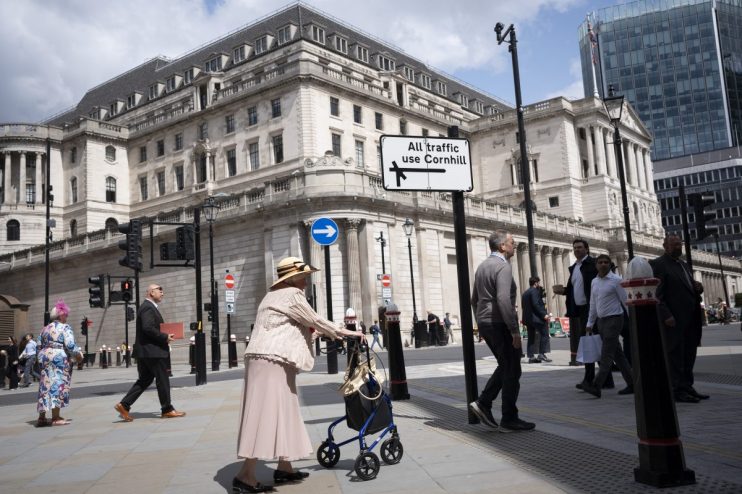
Employment levels deteriorated in March, official data has suggested, in signs that Chancellor Rachel Reeves’ £20bn tax raid on employers has squeezed firms’ profits.
Figures released by the Office for National Statistics (ONS) revealed that the number of payrolled employees fell by 53,000 over the first three months of the year.
The early estimate of payrolled employees for April showed a decrease by 33,000.
Signs that inflation may remain sticky in the months ahead were also represented by high levels of annual pay growth excluding bonuses, which hit 5.6 per cent in the three months to March.
It could deepen challenges for interest rate-setters at the Bank of England though wage growth in the three months to March was slightly lower than the 5.7 per cent figure pencilled in by Bloomberg, which polled several economists in the lead-up to the release.
It also came in below recent figures showing wage growth was 5.9 per cent in the three months to February.
Total pay growth, which includes bonuses, was 5.5 per cent between January and March while unemployment edged up to 4.5 per cent.
“Wage growth slowed slightly in the latest period but remains relatively strong, with public and private sectors now showing little difference,” Liz McKeown, director of economic statistics at the ONS, said.
“The broader picture continues to be of the labour market cooling, with the number of payroll falling in the first quarter of the year.
“The number of job vacancies has also fallen again, with the rate of decline increasing in the last few months.”
Institute of Directors policy advisory Alex Hall-Chen said the figures showed the government needed to take “urgent action” on improving employment levels.
“The business case for hiring has been weakened by a perfect storm of last month’s increased employer national insurance contributions and above-inflation increases to the minimum wage, alongside a wave of measures in the Employment Rights Bill which will make hiring staff riskier and costlier,” Hall-Chen said.
Inflation hit 2.6 per cent in March but forecasters generally agree price growth will exceed three per cent in April after tax rises kicked into effect.
The prediction of higher inflation made by leading City analysts and fresh employment data might alert Monetary Policy Committee members at the Bank of England, given its target is to hit two per cent inflation, as well as officials at the Treasury, who have made stabilising the UK economy a key mission.
A deputy governor at the Bank of England, Clare Lombardelli, said persistently high wage growth could lead to “second-round effects” in inflation spiking again this year, making her decision-making as a rate-setter more difficult.
In a speech heard by an audience at a conference in London on Monday, Lombardelli said: “Wage growth is still too high to be consistent with inflation at target.”
“The evidence suggests that at 4.25 per cent monetary policy is still restrictive, so if we were to find ourselves in a world with greater inflation persistence than expected, policy would still be providing pressure to squeeze inflation out of the system.”
Capital Economics’ Ruth Gregory said the combination of “weakening labour activity” and “still-high” wage growth made the Bank’s next interest rates decision harder.
” If the jobs market remains weak, then underlying price pressures should eventually fade markedly,” Gregory said.
“But sticky wage growth may mean the Bank remains uneasy about inflationary pressures in the near term. As a result, the ‘gradual’ interest rate cutting path will remain the balancing act.”
Many economists and policymakers alike may take a skeptical view over the accuracy of fresh labour market data provided by the ONS.
Unemployment problems
The UK stats body has been dogged by several problems over the last few months.
The remaking of its flagship labour force survey, which gathers data on employment, has been delayed to at least 2026 while other key data that informs GDP estimates has also been postponed.
It currently has no permanent head after Professor Sir Ian Diamond quit over health issues.
Denise Lievesley, a former president of the Royal Statistical Society, told the Financial Times that the role holding the title of UK national statistician should be split into two due to the pressures of overseeing the gathering of key data.
A review of its recent performance is underway, with the Cabinet Office expected to push through reforms imminently.









